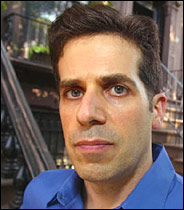 The novelist Jonathan Lethem has been on a most unusual book tour, promoting and selling his latest novel and at the same time publicly questioning the copyright system that guarantees his livelihood. Intellectual property is a central theme in his new book, You Don’t Love Me Yet, which chronicles a struggling California rock band who, in the course of trying to compose and record a debut album, progressively lose track of who wrote their songs. Lethem has always been obsessed with laying bare his influences (he has a book of essays devoted in large part to that), but this new novel, which seems on the whole to be a slighter work than his previous two Brooklyn-based sagas, is his most direct stab to date at the complex question of originality in art.
The novelist Jonathan Lethem has been on a most unusual book tour, promoting and selling his latest novel and at the same time publicly questioning the copyright system that guarantees his livelihood. Intellectual property is a central theme in his new book, You Don’t Love Me Yet, which chronicles a struggling California rock band who, in the course of trying to compose and record a debut album, progressively lose track of who wrote their songs. Lethem has always been obsessed with laying bare his influences (he has a book of essays devoted in large part to that), but this new novel, which seems on the whole to be a slighter work than his previous two Brooklyn-based sagas, is his most direct stab to date at the complex question of originality in art.
In February Lethem published one of the better pieces that has been written lately about the adverse effects of our bloated copyright system, an essay in Harper’s entitled “The Ecstasy of Influence,” which he billed provocatively as “a plagiarism.” Lethem’s flippancy with the word is deliberate. He wants to initiate a discussion about what he sees as the ultimately paradoxical idea of owning culture. Lethem is not arguing for an abolition of copyright laws. He still wants to earn his bread as a writer. But he advocates a general relaxation of a system that has clearly grown counter to the public interest.
None of these arguments are particularly new but Lethem reposes them deftly, interweaving a diverse playlist of references and quotations from greater authorities from with the facility of a DJ. And by foregrounding the act of sampling, the essay actually enacts its central thesis: that all creativity is built on the creativity of others. We’ve talked a great deal here on if:book about the role of the writer evolving into something more like that of a curator or editor. Lethem’s essay, though hardly the first piece of writing to draw heavily from other sources, demonstrates how a curatorial method of writing does not necessarily come at the expense of a distinct authorial voice.
The Harper’s piece has made the rounds both online and off and, with the new novel, seems to have propelled Lethem, at least for the moment, into the upper ranks of copyright reform advocates. Yesterday The Washington Post ran a story on Lethem’s recent provocations. Here too is a 50-minute talk from the Authors@Google series (not surprisingly, Google is happy to lend some bandwidth to these ideas).
For some time, Cory Doctorow has been the leading voice among fiction writers for a scaling back of IP laws. It’s good now to see a novelist with more mainstream appeal stepping into the debate, with the possibility of moving it beyond the usual techno-centric channels and into the larger public sphere. I suspect Lethem’s interest will eventually move on to other things (and I don’t see him giving away free electronic versions of his books anytime soon), but for now, we’re fortunate to have his pen in the service of this cause.
if:book
A Project of the Institute for the Future of the Book

Here’s a great video of Lethem @ Google giving a talk about these issues. It’s 52 minutes but worth the watch.
Authors@Google: Jonathan Lethem